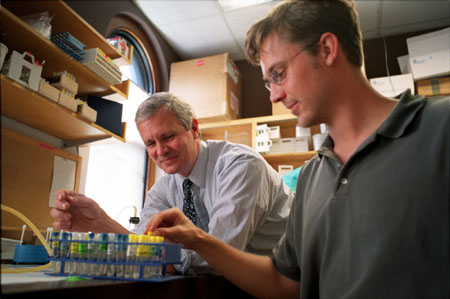Marriage lowers testosterone
Hormones range less on the homestead

A man’s testosterone levels drop significantly when he holds an infant. Even holding a baby doll can decrease levels of the male virility hormone.
Married men, whether fathers or not, have markedly lower testosterone levels than single males, according to one of the first studies of how the hormone changes when men marry and become fathers. Results of the study, done by a team of Harvard University anthropologists, increase our knowledge of human biology and may have implications for so-called “male menopause.”
Researchers have long suspected that levels of the hormone largely responsible for fighting, competing, and mating decrease when men settle down and start a family. Other studies have showed that testosterone begins to decline shortly after marriage, but surges upward when unions end in divorce.
“It makes sense,” notes Peter Ellison, professor of anthropology. “Lower levels of testosterone may increase the likelihood that men will stay home and care for their wives and kids, while decreasing the likelihood they will go out drinking with the guys and chase other women.”
To pin down precisely how hormones vary between single men, married men without children, and married men with children, graduate student Peter Gray and his colleagues tested a total of 58 men in the three categories. Testosterone can easily be measured by analysis of saliva, and the men, all from the Boston area, willingly spat for science. Forty-eight of the 58, who ranged in age from 20 to 41 years, were affiliated with Harvard University.
The analyses showed little difference between married men with and without children, but both had significantly lower testosterone levels than unmarried fellows.
The men also took written tests to indicate how much time each one spent with his wife and children. They answered questions about how much attention they gave their wives on their last day off, rather than golfing or hanging around with male friends. Those with higher scores on these “spousal investment” quizzes had lower testosterone levels.
“These results suggest that testosterone levels involve a trade-off between mating and parenting efforts,” says Gray. “Single men invest only in mating, while fathers decrease their mating efforts in favor of parenting.”
Hormones and behavior
The next question to answer is whether the same changes in testosterone occur in other societies where mating and parenting behaviors differ from those in the United States or Europe. Male Aka pygmies in Africa, for example, spend much more time holding babies than do men in California or England. In other parts of Africa, herders of sheep, goats, and cattle spent much less time with their children.
Gray just finished a study in Kenya where he tested the saliva of 88 Muslim men, some of whom had two wives. “I thought guys with two wives would have lower testosterone than those with one wife, but that turned out not to be so,” notes Gray. “The connections we found between hormone levels among men in Kenya and those in Boston were much different than expected.”
“Peter’s work is important for showing that there is more variability in male hormones than you read about in medical textbooks,” comments Ellison. “Understanding this variability has consequences for health and behavior that we never suspected 10 to 15 years ago.”
Ellison, who is also dean of the Graduate School of Arts and Sciences at Harvard, has, with colleagues, looked at the effects of aging on testosterone levels in places as diverse as Boston, the Congo, Nepal, and Paraguay. The findings, soon to be published in the journal Human Reproduction, reveal that males in these countries have very different levels of testosterone in their 20s, but the amounts become about the same by age 60.
Boston men boasted the highest levels among young adult males, probably because of better diets and an environment that promotes rapid growth and development. “Investigations over the past 15 years show that women exhibit a similar pattern,” Ellison points out. “Women of reproductive ages in Western industrial nations have higher levels of ovarian hormones than those in rural areas of undeveloped countries.”
“These differences mean that social and ecological conditions exert a strong influence on how high reproductive hormones rise in young adults,” Ellison says. “Not everyone’s hormone levels are like those of people in Boston or London.”
Male menopause?
If testosterone levels flatten out at age 60, does that mean males undergo a menopause? “No,” answers Ellison. “Male testosterone lessens with age but there’s no discrete end. No cliff that it falls off as when women use up their finite supply of eggs. For men in places like Boston, the testosterone drop is greater because the starting point is higher.”
One physician puts it this way: “Men don’t have menses to pause.”
It’s unethical for scientists to manipulate testosterone levels in men to see what happens, but Gray and Ellison take note of what they call “a silent experiment” that is taking place. Physicians wrote more than a million prescriptions for the hormone in 2001 for men who hope that it will raise their libido, slow aging, and reduce muscle and bone loss. No scientific study has conclusively showed this will actually happen, but demand is high for testosterone patches and Androgel, a salve that men rub on their skin.
Many athletes look to steroid hormones to increase their performances. Mark McGwire, well known for his home run record, publicly admitted taking testosterone-laden androstenedione, which Ellison calls “a drug masquerading as a food supplement.”
“What will be the result of millions of middle-aged men rubbing themselves with Androgel?” Ellison wonders aloud. “Will hormone replacement therapy reduce their motivation to care for their children or increase their infidelity? Or will it vitalize marriages? What will be the consequence for athletes of steroid use over many years?”
There is a clear association between high testosterone levels and prostate cancer, and evidence that the hormone raises the risk for heart attacks and strokes.
“As women are learning from studies of estrogen use,” Ellison notes, “biological benefits often couple with costs. With that lesson in mind, I’m not about to start slathering myself with Androgel.”




